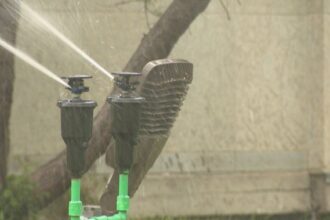In the rolling fields of Prince Edward Island, a surprising agricultural innovation is taking root that merges traditional livestock management with cutting-edge technology. Canadian potato farmers have begun equipping their cattle with specially designed electric collars, revolutionizing an age-old symbiotic relationship between bovines and agriculture.
The collars, developed through a collaboration between agricultural scientists at the University of Guelph and technology specialists from Montreal-based AgriTech Solutions, emit mild electrical pulses that guide cattle to graze in specific patterns across fallow potato fields. This targeted grazing serves multiple purposes that are proving crucial to sustainable farming practices.
“What we’re seeing is a 22% increase in potato yields in fields where the collar-guided cattle have grazed compared to our control plots,” explains Dr. Marianne Thompson, lead researcher on the project. “The precision movement of the cattle ensures even distribution of natural fertilizer while simultaneously reducing soil compaction issues we’ve struggled with for decades.”
The technology works through a GPS-enabled system that creates virtual boundaries, directing cattle away from sensitive areas while encouraging them to linger where the soil requires more attention. Farmers can program grazing patterns through a smartphone application, essentially turning their herds into precision agricultural tools.
For fifth-generation potato farmer Robert MacKenzie of Summerside, the results have been transformative. “We’ve reduced our synthetic fertilizer use by nearly 40% since implementing the collar system,” MacKenzie told CO24 during an on-site demonstration. “Not only are our yields up, but our soil health metrics have improved dramatically.”
Environmental scientists monitoring the program note that the approach addresses multiple challenges facing modern agriculture. The reduction in chemical fertilizers has led to measurable improvements in local watershed quality, while the enhanced potato yields help address food security concerns without expanding farmland footprint.
The initiative has garnered attention from agricultural ministries across Canada, with Ontario and Alberta launching pilot programs this spring. The federal Department of Agriculture has allocated $3.7 million in funding to expand research into how this technology might benefit other crop systems beyond potatoes.
The electric collars themselves weigh less than 300 grams and are designed with animal welfare as a priority. Veterinary oversight has been built into the program from its inception, with regular monitoring ensuring the cattle experience no distress from the gentle guidance system.
“This represents the kind of innovation Canadian agriculture needs—solutions that honor traditional farming wisdom while embracing technological advances,” notes Catherine Bellefleur, Director of Agricultural Innovation at the Canadian Farming Council. “The beauty is in its simplicity. We’re essentially digitizing and optimizing practices that farmers have used for centuries.”
As climate change continues to pressure agricultural systems worldwide, could these electric-collared bovines represent a model for how technological innovation and traditional farming practices might combine to create more resilient food systems? For Canadian potato farmers watching their yields climb while their environmental impact decreases, the answer appears increasingly clear.







